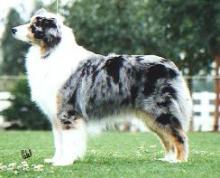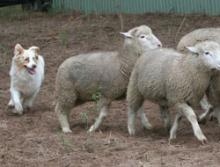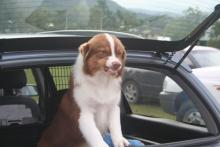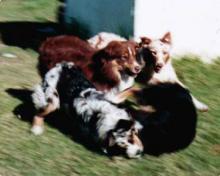About Aussies
Aussies in Profile

Aussies in the Past

The Australian Shepherd was actually developed in America but there is much debate over the origins of the foundation stock. It is believed the dogs travelled over with the flocks of Merino sheep and the Basque shepherds who tended them. Some contend they came to Australia from Spain when the first Merino sheep arrived and then travelled to America, others believe they were Australian sheep dogs derived from the Smithfield and some type of collie, possibly the German Coolie or it's ancestor. More recently the theory has been put forward that the dogs travelled directly from Europe with Merino flocks. The name came about because of the believed link with this country.
Further historical research needs to be done but there is evidence that this type of dog has been worked here in the past and documentary evidence show animals having been sent to America as late as the 1950's. Once in America the aussies were used to herd sheep and later cattle, developing quite a reputation as a working dog. Legend has it that these dogs were held in reverence by the Indians because of their unusual and often blue eyes, therefore they came to be known as the "ghost-eyed ones". The Indians left these sacred "spirit" dogs and their owners unharmed. Now days they are popular as a family pet, an obedience and agility dog, a worker and now a show dog.
To read more about the history of the Aussie read The History of the Australian Shepherd.
Aussies in the Present
In America, Aussies were fully recognised by the American Kennel Club in 1993. The delay in recognition was caused by fear that the dogs would be bred for the conformation ring only, which would lead to a loss of their working ability.
In Australia, the breed is slowly gaining in recognition and popularity. Mrs Shirley Ford (re)introduced the breed in 1990 when she emigrated from England with family and four Aussies. Further imports have since arrived which has increased the breeding stock dramatically with Aussies represented in all states of Australia.
The breed was fully recognised by the Australian National Kennel Council (ANKC) on the 1st January 1994. Aussies are now commonly being seen competing in Conformation, Obedience, Agility, Endurance, Tracking, Herding and other dog sports.
Breed Characteristics

While not nuisance barkers, Aussies are vocal in play with other dogs and people with a range of vocalisations they 'talk' with the best of them. You will never need a doorbell again, they will let you know when something isn't right which is why socialisation to what is acceptable is so important.
Not to be mistaken for snarling, or aggressive intent, Aussies love to smile and grin when acting the clown or if they think they might be in trouble. They can combine this with carrying a toy, bending themselves into banana shapes and walking sideways. Consider yourself very fortunate if you get all 4 of these at the same time!
Like toy carrying, Aussies can be a tad obsessive around water. Not all will go to an extreme, many will even avoid getting their feet wet when it's raining; but if they do like water, then they REALLY like water.
Forget about your personal space! There are no boundaries your Aussie will not help themselves over, under or through. You will never visit the toilet alone again.
Aussies in Summary

Aussies are not the breed for everyone! They are herding dogs and even in the most show bred lines, the herding instinct will still exist to some extent (chasing, nipping, circling).
They are smart, sometimes smarter than their owners! This has the down side of chronic boredom if they are not kept occupied. Bored dogs are not fun to live with. They will bark, dig holes, destroy gardens and chew anything left in reach.
Obedience training is a must for any Aussie. This will help socialise you puppy, and help your relationship with your dog. You will learn valuable tools to help manage your dog and you may even get hooked.
An Aussie needs a job, this might be as simple as to help you in your occupation, or as advanced as helping you work your stock on a farm. If you do not give your Aussie a job, it will create one for itself! I don't need to tell you that the job it chooses may not be the best for your situation. You must be committed to giving the time and attention necessary to expend its mental and physical energy.
The Aussie is to be reserved with strangers, this does not mean shy or aggressive, simply that they are unconcerned. Is it very important that the Aussie is well socialised as a puppy.
Aussies live a long time. This is a huge commitment that will last 10 to 15 years or more. Think it through. If they are the breed for you, you will be rewarded with a loyal companion.
